Catholicism, Nazi Resistance and Corona
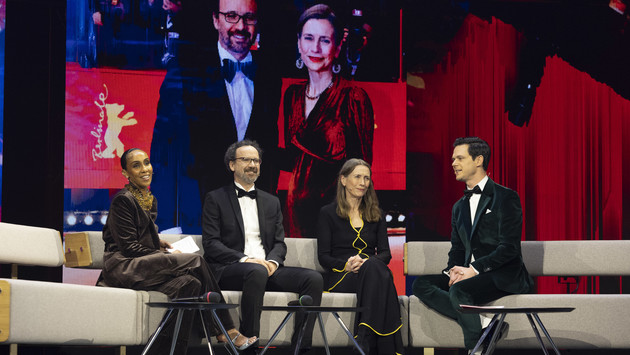
Carlo Chatrian and Mariëtte Rissenbeek with the moderators Hadnet Tesfai (left) and Jo Schück (right) at the Berlinale opening (© Richard Hübner / Berlinale 2024).
When Mariëtte Rissenbeek and Carlo Chatrian took over as directors of the Berlinale in 2019, they received much praise in advance. The two promised structural reforms, the programme was to be streamlined and the contours of the competition and the sidebars sharpened. Five years later, the results are sobering. A section such as "Culinary Cinema" has disappeared, and the "Perspektive Deutsches Kino" series has also been cancelled. Instead, artistic festival director Carlo Chatrian installed a side competition, "Encounters", including its own jury, although it remains unclear who is supposed to meet whom here. The sections "Berlinale Gala" and "Gala Special" have also been expanded. In total, the Berlinale screened 236 films this year (including short films) compared to 287 last year - a significant streamlining.
Toxic Catholicism
The opening with "Small Things Like These" (Ireland, Belgium 2024) turned out to be quite impressive. Cillian Murphy, Oscar nominee for his role in "Oppenheimer", plays coal merchant Sam Ferguson in a small Irish town in the 1980s. We watch him at work without knowing where the film is going. Gradually, individual images and impressions come together to form a larger picture and we begin to understand the connections. The camera focuses intensely on the main actor's face. The dialogue is casual and reserved, almost everything is told through looks and gestures.
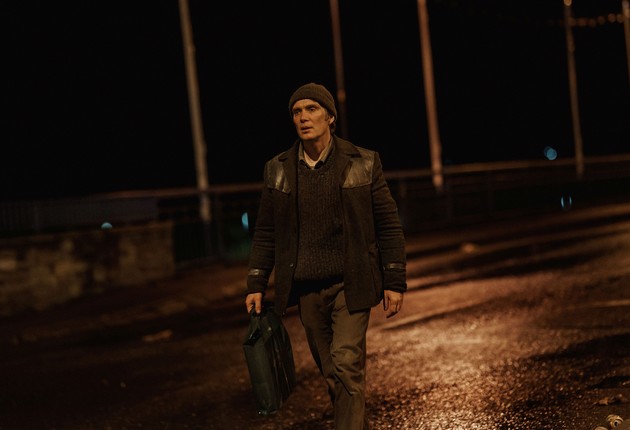
Among the coal merchant's customers are the nuns of the Magdalene Sisters, who look after "fallen girls", i.e. unmarried pregnant women. In the convent, they have to work unpaid in the laundry and their children are taken away from them after birth. Cillian Murphy plays the protagonist as a quiet melancholic, a family man with five daughters who is haunted on sleepless nights by memories of the traumas of his childhood. What he observes in the Magdalene Sisters' convent will not let him rest. In the 1980s, however, the Catholic Church in Ireland is still an all-dominant institution that is best not messed with. Although his wife warns him ("These nuns have their fingers in every pie"), he makes a far-reaching decision that will have a lasting impact on his life and that of his family.
In the press conference, Cillian Murphy described his character as "a Christian man who does a Christian thing in an un-Christian society".
Peter Mullan had already explored the decade-long abuse in Irish girls' homes in his film "The Magdalene Sisters" (Great Britain, Ireland 2002). "Philomena" by Stephen Frears (Great Britain 2013) also deals with the trauma of a young mother whose child was given up for adoption to a 'Christian' family.
"Small Things Like These" is based on the eponymous novel by Irish author Claire Keegan, which was a huge bestseller in Ireland and has been published in German by Steidl in 2022. The screenplay was written by renowned playwright Enda Walsh and the film was directed by Belgian Tim Mielants, with whom Cillian Murphy worked on the successful series "Peaky Blinders".
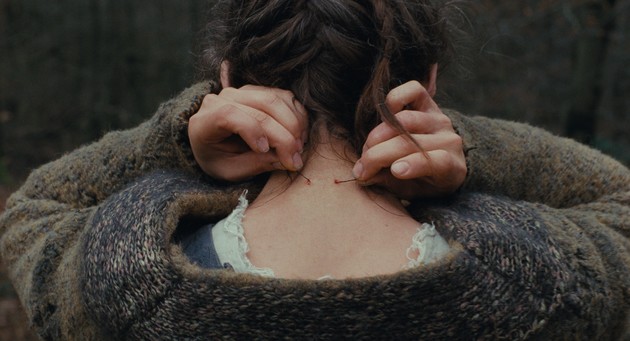
Veronica Franz and Severin Fiala deal with a different form of toxic Catholicism in "Des Teufels Bad" (The Devil's Bath, Austria, Germany 2024). In a village in 18th century Upper Austria, the freshly married Marie (Anja Plaschg, who also composed the film score) is crushed by the harsh daily routine at her husband's side. She is a tender, romantic soul who prefers to observe nature and collect butterflies instead of catching carp in the murky pond. The loneliness in their remote house in the middle of the forest is increasingly distressing her. The devout Marie falls ill, she no longer wants to get up and the suicide of a neighbour finally throws her off course. In order not to end up like him, who is not given a Christian burial and is thrown into the open countryside, she kills a boy and then confesses. As a repentant sinner, she can hope for heavenly forgiveness, even if she is later being executed and her head and body are displayed in the forest as a memento. As we learn in the end credits, there are believed to have been over 400 cases of women who sought death in this way during the 18th century.
"The Devil's Bath" - the title refers to a contemporary term for melancholy - recounts a dark, little-known chapter of female history in the age of enlightenment.
Great names
Andreas Dresen is a major figure in German cinema. His new film "In Liebe, Eure Hilde" (From Hilde, With Love) was a highlight of the first Berlinale weekend. It focuses on the historical figure Hilde Coppi (Liv Lisa Fries), who, together with her husband Hans, sends radio messages to Moscow as part of the resistance against Hitler. She is pregnant when she is arrested and gives birth to her child in prison. Her group of friends around Arvid Harnack and Harro Schulze-Boysen became known as the "Rote Kapelle" (Red Orchestra). Because of their communist convictions, they were sidelined in the West after the war and exalted as heroes of the resistance in the GDR.
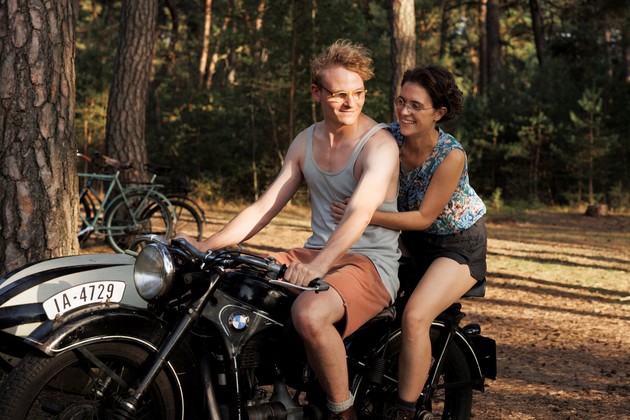
Andreas Dresen succeeds in creating a nuanced picture of young people that avoids all the NS clichés. He doesn't need swastika flags, marches and Nazi uniforms to depict the historical circumstances. Critics accused him as lacking in this respect, while others found the film too "conventional". A death sentence in the context of a festival. But both accusations are beside the point. Dresen and his screenwriter Laila Stieler paint an atmospherically dense portrait of a murderous time in which resistance is a matter of life and death. "What fascinated me about Hilde Coppi," says the screenwriter, "was that she was so incredibly young when she joined the resistance. I was attracted by her youth and her courage. At the same time, she was a very fragile, almost timid figure. That stands in stark contrast to what she did. I found that very interesting."
The film systematically follows the female perspective of its main character. We only see and experience what Hilde experiences. Like her, we are not given any additional information about the other members of the group or the details of their resistance actions. (One prominent critic considered this approach to be a shortcoming of the film and pointed out that Hilde Coppi was, after all, a "communist"). Liv Lisa Fries embodies the central character in an impressive way. Entirely without the artificial Berlin dialect that was imposed on her in the series "Babylon Berlin". It seems sadly ironic to discover that, following research in Russian archives, only one of the Red Orchestra's radio messages ever reached Moscow.
"From Hilde, With Love" strikes me as more authentic and closer to its characters than other films that have dealt with National Socialism. In my opinion, it is one of the most intelligent cinematic approaches to the Nazi era that has been seen in German cinema.
Corona Time Out
There's no need to say much about Olivier Assayas. He is undoubtedly one of the most versatile and experimental directors in contemporary French cinema. With "Hors du temps" (Out of Time, France 2024), Assayas recalls the time of the Covid lockdown, known in France as "confinement", in a surprisingly cheerful way. He combines autobiographical reflections with the story of two brothers who get on each other's nerves locked up in their parents' country house. Incidentally, Assayas shot the film in the country house of his childhood, where he lives today.
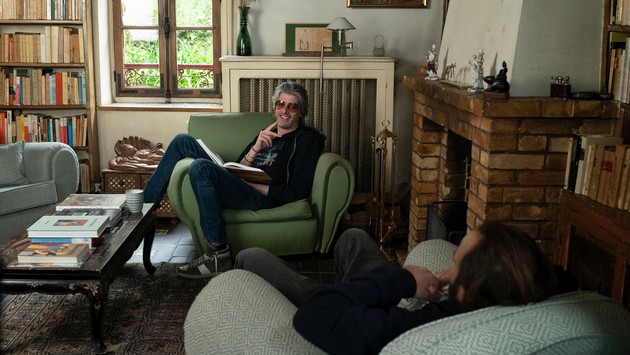
Paul (Vincent Macaigne) follows all the coronavirus rules with fundamentalist zeal, ordering manically from Amazon and leaving the parcels outside the door for four hours so that, as he believes, the surface contamination will dissipate. His brother Etienne (Micha Lescot) is a cool rock critic with a penchant for crêpes who has retained the hairstyle of his youth. His brother's coronavirus hysteria gets on his nerves, which leads to heated arguments and absurd dialogue. Then there are the female partners who, like the men, are busy organising their old relationships or marriages. As expected of French intellectuals, there is no shortage of literary and cultural references, e.g. to Eloise and Abelard, Racine or the English painter David Hockney. In any case, the house and garden look as if they have come straight out of an impressionist painting by Claude Monet. Blue field flowers bloom in the park, the grass sways in the wind. During flashbacks from their own youth, the scenery quickly switches to black and white. A feel-good film about the positive sides of the corona lockdown - très français.

